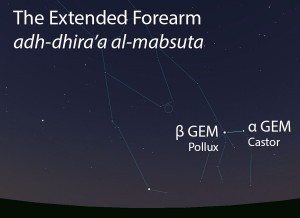Star Names
The Extended Forearm (adh-dhira’ al-mabsuta)
The Extended Forearm is one of the Two Forearms (adh-dhira’an) of the Arabian megaconstellation of the Lion (al-asad). At some point, the Two Forearms were differentiated by the Arabs as the Clenched Forearm (adh-dhira’ al-maqbuda) and the Extended Forearm (adh-dhira’ al-mabsuta). The Extended Forearm was the second pair to set.

The Extended Forearm (adh-dhira’ al-mabsuta) as it appears in the west about 45 minutes before sunrise in early January. Sky simulations made with Stellarium.
Appearance
A pair of bright stars that follows the figure of Jawza’.
Modern Identification
α GEM (Castor), blue-white multiple star, magnitudes 1.6, 2.0, 2.9
β GEM, (Pollux), orange giant star, magnitude 1.1
Timing
Ibn Qutayba (d. 879 CE) reported that the Extended Forearm was said to rise on the morning of July 5 and set on the morning of January 5. On account of the precession of the equinoxes, today we can expect to observe the Extended Forearm setting at the end of January and rising in late July, as seen from the latitude of Tucson. (See How to Observe on the About page for more on this topic.)
Rain Stars
In the calendars of Qushayr and Qays, the morning settings of the Two Forearms (adh-dhira’an) together occur during the cold winter season called ash-shita’.
Lunar Stations
Although the ecliptic (the path of the Moon against the stellar background) passes more or less right between the two pairs of stars that made up the Two Forearms, the Moon comes somewhat closer to the Extended Forearm, and so within the context of the lunar stations only it, and not the Clenched Forearm, had the honor of being a lunar station. In early listings of the lunar stations, the Extended Forearm is the ninth station of the year. This was later changed to the seventh lunar station after the stations were adjusted to begin with the vernal equinox. The stars of the Extended Forearm match the Hindu nakshatra called Punarvasu.
Related Stars and Celestial Complexes
The Extended Forearm is part of the Lion (al-asad, الأسد) folkloric celestial complex, which extends from the Two Forearms (adh-dhira’an, الذراعان) to the Two Shanks (as-saqan, الساقان).
Related Blog Posts
The Protracted Roaring of the Lion

